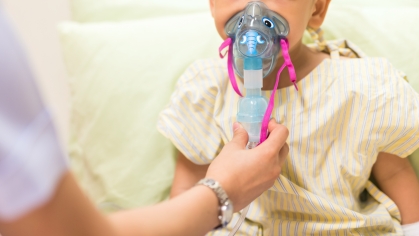Rutgers Center for Health, Identity, Behavior and Prevention Studies Premiers Film on LGBTQ+ Health Equity

The documentary interviews leading LGBTQ+ health and public health experts in New Jersey
The Rutgers School of Public Health’s Center for Health, Identity, Behavior and Prevention Studies (CHIBPS) premiered the short film “Queer Health: Advancing LGBTQ+ Health Equity.”
“Queer Health,” which aired at the annual American Public Health Association Meeting and Expo, focuses on how we can move toward and achieve health equity for LGBTQ+ people and populations through research, education, and community-engaged programs by chronicling the work of CHIBPS, a nationally recognized center for the study of LGBTQ+ health at Rutgers. The center focuses on infectious disease, substance use, and mental health dipartites and burdens.
The documentary includes interviews with leading LGBTQ+ health and public health experts in New Jersey and highlights the 18.3 million LGBTQ+ people living in the United States. LGBTQ+ people have higher rates of mental health problems, including depression, mood disorders, substance use and suicidal ideation, according to experts. They also experience higher rates of some cancers and are disproportionately impacted by HIV and other sexually transmitted infections. LGBTQ+ people are also less likely to access health care for a variety of reasons including previous discrimination, stigma, financial concerns, fear of negative interactions with clinicians, and a lack of medical professionals trained in LGBTQ+ health.
Emphasizing the work of CHIBPS since the late 1990s, the film proposes an inclusive powerhouse institute that will advance health and visibility, as well as address health disparities that LGBTQ+ people face in New Jersey and beyond. The planned Rutgers Institute for Sexual and Gender Minority Heath would be an incubator for individuals to come together to advance LGBTQ+ health efforts in a unified way.
“Too often efforts to address the health of LGBTQ+ people are fragmented and disconnected,” said Perry N. Halkitis, founder and director of CHIBPS. “Researchers work separately from clinicians, who work separately from policymakers. Efforts to unite these professionals will create a holistic approach to improving the health and well-being of LGBTQ+ people.”
The institute will provide a space where research, education, policy, and clinical services are coordinated.
“The institute will develop policies, laws, and white papers that advance LGBTQ+ health issues,” added Halkitis, who also is dean and Hunterdon Professor of Public Health and Health Equity and a Distinguished Professor at the Rutgers School of Public Health.
Halkitis, along with other leading LGBTQ+ health and public health experts, explains that there are very few such institutes in the U.S., with none in New Jersey.
“The dream is that the Rutgers Institute for Sexual and Gender Minority Heath will be the home of all LGBTQ+ health work being done at Rutgers and in New Jersey,” said Kristen Krause, deputy director of CHIBPS and instructor at the Rutgers School of Public Health.
The film also highlights hundreds of bills that have been introduced by legislators in recent years that threaten, oppress, and silence LGBTQ+ people.
“Many bills have passed, undermining the health and well-being of LGBTQ+ people and populations,” adds Krause.
The work of CHIBPS, the Rutgers School of Public Health, and the proposed Rutgers Institute for Sexual and Gender Minority Heath is especially critical as anti-LGBTQ+ hate and violence continue to occur at alarming rates.
“LGBTQ+ people have long been subject to discrimination and prejudice in all aspects of their lives. In recent years, the rhetoric against members of the LGBTQ+ population - uplifted by political figures as a means of advancing their own careers - has enabled those like the Colorado Springs shooter,” says Halkitis.
“In the end, hate, is the most significant driver that diminishes public health,” he adds.
One of the ways that the Rutgers School of Public Health, seeks to combat this oppression is through programs like the first known master of public health concentration in LGBT public health. The concentration prepares graduate-level students to conduct research and work in public health programs dedicated to improving the health of LGBTQ+ individuals and communities.
In addition to the work being done by CHIBPS and the LGBT public health concentration, faculty members like Rafael E. Pérez-Figueroa, associate dean of community engagement and public health practice, conduct research that takes into consideration social factors and conditions, including representing the most vulnerable sexual and gender minority individuals and groups.
“Ever since Rutgers hired Dean Halkitis, the school has taken an entirely new direction,” said James Dougherty, a member of the Rutgers University Board of Governors and past Chair of the Board of Trustees, who was the principal donor to the university’s Pride Bus Campaign.
Halkitis leaves the film’s viewers with a powerful message of hope.
“I want to say to people, particularly young people, who are questioning, wondering, and thinking about their sexual and gender identities that there are a lot of us out there who are in really powerful positions right now who are going to continue to fight for you,” Halkitis said. “So don’t give up.”



